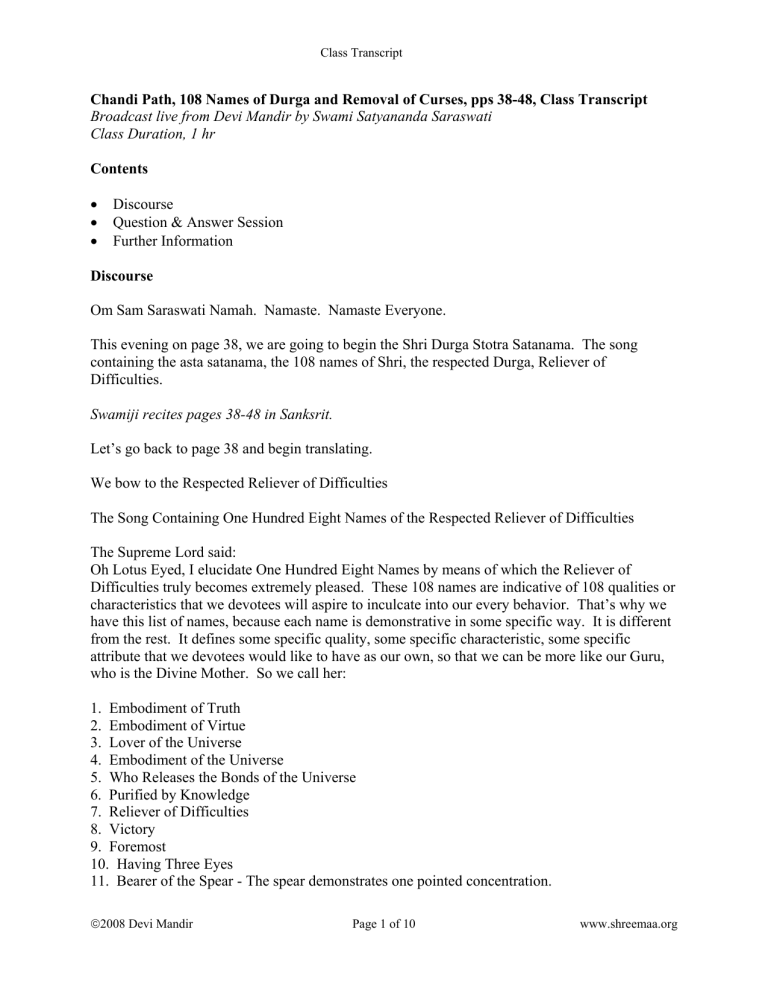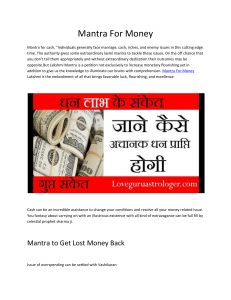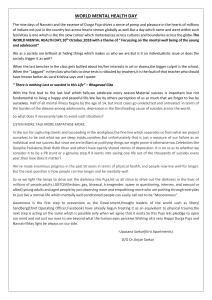
Class Transcript Chandi Path, 108 Names of Durga and Removal of Curses, pps 38-48, Class Transcript Broadcast live from Devi Mandir by Swami Satyananda Saraswati Class Duration, 1 hr Contents Discourse Question & Answer Session Further Information Discourse Om Sam Saraswati Namah. Namaste. Namaste Everyone. This evening on page 38, we are going to begin the Shri Durga Stotra Satanama. The song containing the asta satanama, the 108 names of Shri, the respected Durga, Reliever of Difficulties. Swamiji recites pages 38-48 in Sanksrit. Let’s go back to page 38 and begin translating. We bow to the Respected Reliever of Difficulties The Song Containing One Hundred Eight Names of the Respected Reliever of Difficulties The Supreme Lord said: Oh Lotus Eyed, I elucidate One Hundred Eight Names by means of which the Reliever of Difficulties truly becomes extremely pleased. These 108 names are indicative of 108 qualities or characteristics that we devotees will aspire to inculcate into our every behavior. That’s why we have this list of names, because each name is demonstrative in some specific way. It is different from the rest. It defines some specific quality, some specific characteristic, some specific attribute that we devotees would like to have as our own, so that we can be more like our Guru, who is the Divine Mother. So we call her: 1. Embodiment of Truth 2. Embodiment of Virtue 3. Lover of the Universe 4. Embodiment of the Universe 5. Who Releases the Bonds of the Universe 6. Purified by Knowledge 7. Reliever of Difficulties 8. Victory 9. Foremost 10. Having Three Eyes 11. Bearer of the Spear - The spear demonstrates one pointed concentration. 2008 Devi Mandir Page 1 of 10 www.shreemaa.org Class Transcript 12. Bearer of the Trident – Trisul of the harmony of the threes. All the threes unite in harmony in balance as a weapon in the hands of the Divine Mother and the Divine Father. 13. Characterized by Diversity – She is unity in diversity. She is the unifying principal amongst the diverse form and names within the creation. 14. Who Makes Beautiful Subtle Sounds 15. Who Performs the Great Discipline of Austerities 16. Mind 17. Intellect 18. Ego - Purified ego but ego. 19. The Form of Recollection – Remember, the mind is all the subjective thoughts that we inculcate during the day. I like this, I do not like that, this good, that is bad, this is pleasing, that is not pleasing. The intellect is all the objective facts that we contemplate. This is a book. Buddhi is intellect and is true fact. The statement of the true fact is buddhi, the intellect. In the statement of subjective opinion, such as “this is the good book,” good comes from the mind and book comes from buddhi. So all the nouns and verbs of our vocabulary of thought are the intellect (buddhi) and all the adjectives and adverbs are the mind. 20. All Recollection – The combination of buddhi plus mind equals citta, all of it, subjective and objective. 21. Consciousness (18:53) – Consciousness perceives the citta, all the stuff, subjective and objective. 22. The Essence of all Mantras 23. The Intrinsic Nature of Being – Sat Citta Ananda 24. The Intrinsic Nature of the Bliss of Truth 25. Infinite 26. Who Brings Forth Creation 27. The Intensity of Reality 28. The Form of Welfare 29. Who is Always the Same – Look at her. She is always there. She is there for us every time we come. 30. Who is Always in Motion – Would you please stop dancing? 31. Beloved by Consciousness 32. Mother of the Gods 33. Contemplation 34. Beloved Jewel 35. All Knowledge 36. Daughter of Ability – Daksha suta, a name of Parvati, of Sati. Daksha Kanya. Daksha means “ability” and She is the daughter. Ability has one special quality: It always get proud of its abilities! Every time “I” do something well, it is “my” ability so She is the Daughter of Ability. 37. Destroyer of Daksha's Sacrifice – Because every time my ego/ability says, “I am the chief of the sacrifice. Look how well I do the yagya,” She comes along and destroys the yagya. She takes away the energy from the ability and the ability is no longer an attribute of my ego. She removes the egotism of possessing skills. 38. Without Limbs - She has no divisions, no limbs. She is infinite. 39. Of Various Colors, Castes, Tribes - Savarni 40. Of Red Hue - She is like the rising sun 2008 Devi Mandir Page 2 of 10 www.shreemaa.org Class Transcript 41. Adorned by Red Flowers – We decorate her every day with red flowers. 42. Adorned by Silk Garments – We give her our finest. 43. Whose Anklets Make a Beautiful Sound 44. Wielder of Infinite Strength 45. Who is Extremely Severe to Egos 46. Beautiful One 47. Beautiful One of the Gods 48. Reliever of Difficulties from the Forest - And for those of us who live in a wooded forest, she takes away all the difficulties. For those who live in the country forest, she takes away all the difficulties from the forest. 49. Embodiment of Thought 50. Worshipped by the Greatest of Munis 51. Creative Energy - Brahman 52. Energy of the Great Seer of All – Maheshwari 53. Energy of the Rule of the Pure – She is the wife of Indra, the queen of the Gods 54. Ever Pure One 55. Energy that Pervades All 56. Slayer of Passion and Anger 57. Most Excellent Desire of Union 58. Goddess of Wealth 59. Maker of Men 60. Spotlessly Pure 61. Eminent One 62. Embodiment of Wisdom 63. Embodiment of Action 64. Eternal 65. Bestower of Wisdom 66. Extensive 67. Extensive Love 68. Carrier of all Carriers 69. Slayer of Self-Deprecation and Self-Conceit 70. Slayer of the Great Ego 71. Annihilator of Too Much and Too Little 72. Destroyer of Passion and Anger 73. Destroyer of All Egotistical Thought 74. Slayer of All Duality 75. Essence of All Scriptures 76. Truth 77. The Bearer of All Weapons – She has the sword of worship. She has the spear of concentration. She has the club of articulation. She has the discus of revolving time named “Excellent Intuitive Vision.” The Bearer of All Weapons. 78. With Numerous Weapons in Her Hands 79. Bearer of Numerous Weapons 80. Ever Pure One 81. Sole Daughter 82. Incomparable Beauty 2008 Devi Mandir Page 3 of 10 www.shreemaa.org Class Transcript 83. Eternal Youth 84. Ascetic 85. Never Aging 86. Advanced in Age 87. Mother of Old Age 88. Giver of Strength 89. Great Eminence 90. With Loose Hair 91. Of Formidable Appearance 92. One of Great Strength 93. Shining like Fire 94. Of Fearful Face 95. The Dark Night of Overcoming Egotism 96. Performer of Severe Spiritual Discipline 97. Exposer of Consciousness 98. Excel1ent One Beyond Time 99. Measurement of the Al1-Pervading Consciousness 100. Who Came from the Waters – Remember, Lakshmi was born from the ocean. 101. Ambassador of Consciousness 102. Formidable One 103. Infinite 104. Supreme Sovereign 105. Ever Pure One 106. Bearer of Light 107. Perception of the Gross WorId 108. Who Speaks of Infinite Consciousness Oh Goddess, Parvati, He and she who recites these one hundred eight names of the Reliever of Difficulties every day will find no difficulties in the three worlds. He or she will find wealth, food, sons, a loving wife or spouse, horses, elephants, and the four objectives of human life (dharma, artha, kama, moksha). At the end of his earthly existence he will attain eternal liberation. One should worship the Ever Pure One and meditate upon the female Ruler of Gods with the highest selfless devotion. Then the recitation of these one hundred eight names should be commenced. Oh Goddess, who performs in this way attains the highest perfection of the Gods. Kings become his or her servants and he or she commands the wealth of kingdoms. With fragrant gum, lac, red powders (sindoor), camphor, ghee, sugar, and honey, one should draw the graphic representation of this truth according to the rules laid down in the scriptures. Fragrant gum and lac is the sap from trees mixed together with scent. The knowledgeable one who wears such an inscription becomes one with the Consciousness of Infinite Goodness. If you 2008 Devi Mandir Page 4 of 10 www.shreemaa.org Class Transcript can draw the yantra, if you can make kavach, if you can worship the yantra on your plate, you become one with Shiva, the Consciousness of Infinite Goodness. On the evening before the New Moon Day, known as Bhaumavati (if the evening before amavaysa is on a Tuesday) when the celestial configuration is in the asterism known as Satabhisa, one who recites these mantras by putting them in writing becomes the Lord of Wealth. So, if you have an astrological configuration know as Satabhisa and it is Tuesday and it is chaturdashi Krishna paksha, if you recite these mantras by putting them in writing, reciting these mantras, you become the Lord of Wealth. Om now we will take a few sips of water. Om Wisdom I purify the principle of the soul, I bow. I am One with God! May only wisdom come through my lips. I am washing my hands and I am washing my lips so that they are purified from all the extraneous chatter that comes through my mouth. May only wisdom come through. Om Maya I purify the principle of knowledge, I bow. I am One with God! May only knowledge be spoken through this instrument. Om Transformation I purify the principle of Infinite Goodness, I bow. I am One with God! Klim: ka is the cause, la is the gross body, i is the causal body, and anusvar is perfection. Klim is the transformation and it means the “perfection of merging of the gross body into the causal body in the state of perfection.” Om Wisdom, Maya, Transformation I purify all principles, I am One with God! aim hrim klim; Mahasaraswati, Mahalakshmi, Mahakali; srishti, stithi, laya; rajas, sattva, and tamas gunas. All of the threes. And now, we are on the way to being pure. We bow to the Goddess, to the Great Goddess, to the Energy of Infinite Goodness at all times we bow with every behavior. We either bow nicely or not so nicely but we bow with every action. We bow to Nature, to the Excellent One. With discipline we have bowed down. And when we create discipline for ourselves, then we are more assured that it is going to be a good bowing. Everyone take a bow. With discipline, we have bowed down and we know it is a good bow. Meditate upon the Goddess and offer Her five articles of worship, and then bow down to Her. Establish the primal energy with the bija mantra, and then establish the book. With these scented flowers Om we bow to the book. Removal of Curses Now, the mantras of the Chandi Path are so powerful that they have been cursed by Brahma, Vashista, Viswamitra, and others. We are going to all pains to remove the curses because we do not want to abuse our tool. The Chandi Path is a holy scripture and a tool for a personal transformation. It is an opportunity to surrender our selfishness and become a servant to God and unite with God. The curse says that anyone who abuses the tool and uses these mantras for personal selfish gain will not have a tool by which they can surrender their selfishness. It is quite a curse. If we do not have a tool, we wallow in selfishness considerations and we are possessed 2008 Devi Mandir Page 5 of 10 www.shreemaa.org Class Transcript by egotism and selfish attachments. It perpetuates itself until somebody hits us over the head and says, “Hey, there is a tool by means of which we can surrender selfishness and egotism and fill ourselves with the bliss of Infinite Consciousness.” The tool is the Chandi Path. Don’t abuse it. Don’t misuse it. Don’t say, “I am going to chant these mantras. Give me my priestly fee, give me some dakshina, and I will change your karma because of my worship.” If you make this the tool of your earning, your livelihood, if you go out and sell the mantras, if you go out and charge for pujas, then what are you going to do to change yourself? That is the curse. Now, in order to remove the curse, we have to remember why we are chanting the Chandi and what it is for. We begin by the mantra which removes the curses. Sapoddhara mantra - The mantra that removes the curses Om all existence transformation of the gross body merging into the casual body in perfection. Increase and that is the highest respect. Sha means shanti, peace. Ra means your mind. I means your heart. Anusvar means perfection. Peace in your mind, in your heart. Om All existence, transformation, Increase, the Cause of Dissolution in the Gross Body, the Cause of Dissolution in the Causal Body, to the Goddess, She Who Tears Apart Thoughts, take away the curse, take away the curse, I am One with God! [Repeat eleven times] Please remember before you start chanting the Chandi that “I am one with God.” That is the purpose of our sadhana, our tapasya. Utkilana mantra - The mantra that opens the pin Next, we are going to open up the kilak with the utkilana mantra. Remember that there is a dead bolt lock, a pin that locks the door and protects the secret of the Divine Mother. Om increase Shrim increase in respect, increase in true wealth, increase in peace. Om Increase, transformation, all existence, the seven hundred verses of the Chandi, remove the pin, remove the pin, I am One with God! [Repeat twenty-one times] Mrtasamjivani mantra - The mantra that bestows life from death And now we are going to recite the mantra that bestows life from death. All of us have been suffering a spiritual death by ignoring by our spiritual being. We want to revive ourselves and come back into spiritual life. We recite the mantra: Om all existence, all existence, vibrations, vibrations, wisdom, wisdom, Oh knowledge that bestows life from death, raise from death, transformation, all existence, all existence, vibrations, I am One with God! [Repeat eleven times] We are invoking all the vibrations that come from the articulation of these mantras to consume us, to submerge ourselves in those vibrations and forget about all of our little attachments, our problems, our difficulties, our little egotistical selves, and become one with all existence. That is 2008 Devi Mandir Page 6 of 10 www.shreemaa.org Class Transcript the efficacy of the Chandi and that is spiritual life. That is the spiritual life we are seeking to live rather then wandering around in this death where all I can think about is “me” and “mine.” That’s a pretty gross death. This is the way to return to life. Sapavimocana mantra - The mantra that removes the curses We are going to recite another mantra that removes other curses: Om Increase, increase, transformation, cut the ego! Erase the fears of ignorance, remove the pin, remove, remove, devotion, devotion. [Repeat eleven times] Shrim. That is the peace, the peace in my body, the peace in my mind, the peace in my heart, the perfection of peace, increase, increase. We are praying for devotion because I can’t pay attention unless I love it. I force myself to pay attention but I am always looking out the window. But when I fall in love, my attention is natural. It’s a fact of my life. It is not a discipline of my life. It is because I love it. Now, if I could teach myself how to fall in love and inspire myself with discipline, the discrimination by which I choose the right things to fall in love with, wow, what quantum leaps I am making in spiritual development! My evolution is choosing the right things to fall in love with, cultivating that love affair, and making that love into true devotion. We have now removed the first set of curses so that we are qualified to enter into the mystery of the Chandi. Question & Answer Session Is it appropriate to chant just the mrtasamjivani mantra independent of the Chandi Path? Can I take a sankalpa of chanting? Swamiji: Yes, it is. You can use this as a japa mantra; however, it is more efficacious in the context of the Chandi because it is going round out and fulfill an entire disciple of sadhana. But, yes, you can take any one of the mantras of this entire composition of the Chandi and use that as japa. It is wonderful thing to do. Did you know that if you took one mantra a day and made japa of the seven hundred mantras, in less then two years, you would have the entire Chandi memorized! All you need to do is take one mantra a day. Just think how many times it says rishi ruvacha? How many times does it say namastasyai, namastasyai? 66 and that counts within your seven hundred mantras. So, yes, take any one mantra from the Chandi and use it as japa. That is legal. You are allowed and, in fact, encouraged to do that. But take the Chandi Path from beginning to end and it counts as one mantra. And it is enough to transform our lives. What is lac and fragrant gum? I am not able to find that. Swamiji: Lac is pine pitch and fragrant gum is the sticky stuff that comes out of the pine pitch. When you take pine pitch and rub it between your hands, your hands will stick together really tightly. It forms a gum that can be rolled up into a ball. This is called “dhoop” and it burns like incense. You first roll it into a ball and then roll it on a flat surface. Then you can make it into a spindle type structure and add some fragrance. This is essentially how incense is made except that incense has a stick in the middle. They roll a wooden stick in the lac and fragrant gum. After the stick is rolled in pine pitch thinly, it is dipped into a fragrant oil, like a sandal oil. That 2008 Devi Mandir Page 7 of 10 www.shreemaa.org Class Transcript is how you make sandalwood incense. That is why at the bottom of the incense stick, you can always see a little piece of wood sticking out. Above is the gum which is dried onto the stick. It burns very slowly. Is this a separate puja of its own or is it a part of the Cosmic Puja ? Swamiji: This is a separate puja of its own; however, it is also incorporated into the Cosmic Puja. Especially the satanam (the 108 names are included as a stotram in the Cosmic Puja) but all of this precedes the recitation of the Chandi Path. So generally in the Devi Mandir, we perform the Cosmic Puja and then we perform the Chandi Path. Some of the elements of the Cosmic Puja are repeated again. It says in the text, though, that you want to offer five articles at least and in the Cosmic Puja, we have what is called the rajopachar (offering of several articles). (46.24) As a follow-up on last night’s class, for the verse “sarva badha prasamanam trailokyasyakhilesvari evameva tvaya karyam asmad vairivinasanam,” can Swamiji comment on meaning of this mantra and if it would it be effective to include in our daily practices? Swamiji: Absolutely effective for daily practices. Shree Maa used it as a sankalpa for all of 2007. Sarva badha All badha, all vighna, all obstacles, all disturbances, all limitations. prasamanam you terminate them, you wipe them off, You knock them off. trailokyasyakhilesvari You are the supreme sovereign of all the three worlds. evameva in just the same way tvaya from us to you karyam asmad vairivinasanam remove all hostility. vairivinasanam destroy all hostility, all duality, all conflict, remove from us all hostility, all conflict, all confusion in every form. This is an excellent japa mantra. This mantra just continually reinforces the inspiration that the Goddess, the Divine Mother, is always with us, her children. She is destroying all the conflict, all the confusion, all the hostility, all the animosity, all the confrontation. She is defusing every confrontation. This gives us a lot of strength because we meet every conflict, confusion, and confrontation with equanimity, peace, and the knowledge that the Divine Mother is with us and She is not going to allow us to suffer. Excellent mantra. Is there a reason for 11 and 21 recitations of the mantras? Swamiji: Yes, there is. And there are so many reasons. The 11 stands for eleven forms of Rudra and 21 are the various forms of the moon. There are numerological forms. You can do 108 times per mantra but it will prolong your asana. It will be very good for you. However, 11 and 21 are written in the scripture. The sapavimocana mantras are not part of the siddha path. Does that matter? And yet the siddha path is considered to be a complete recitation? Swamiji: Yes, the siddha path is a complete recitation of the seven hundred verses of the Chandi. If you want an entire pradoti, you will read the entire book, cover to cover. When I was a sadhu, I used to read it several times a day from cover to cover. Now that I am the administrator of an ashram, I do not have time so I have to use the shorter Path. Sometimes, I get a holiday. These last few days, some of my friends have inspired me and they have been leading me in chanting a samput Path. So we get to change the style of our chanting according to the necessity of our karma. That is the way of life. It is not one way. It is only one way if you have no more karma left and I haven’t met such a soul yet. 2008 Devi Mandir Page 8 of 10 www.shreemaa.org Class Transcript In light of the curse, is it more important to chant every day even if the focus is not strong or proper or should one not chant the Chandi when we are not able to get properly focused? In that case, what can we do to increase our focus? Swamiji: Do not ever hesitate to chant the Chandi! Chant more and do not worry about whether you are paying attention. I have an agreement with the Divine Mother. I said, “Look, I can’t control my mind, that is up to you. But I promise you one thing. I can control my knees and I am not going to move my knees. Now, my mind will go where it goes but I am not going to move my knees so I can’t get up and go after it.” And that was my agreement with the Divine Mother. Chant! Don’t hesitate to chant! Do not worry about where your mind goes, that is Her problem. You put your body there and say, “I am not moving my body. I do not care where you send my mind.” Pretty soon the mind is going to say, “Aren’t you coming with me?” and you say, “No!” and after awhile, that mind will say “Oh well, if I can’t beat him, I’ll join him. I am going to join you because it is better to sit here with you. Otherwise, where would I be without a body?” Do we have to be initiated in the yantra before we do that part of the puja mentioned in the Chandi? Swamiji: It is a very good idea. So I am just going to give you initiation right now. I am going to tell you to draw the yantra freehand, without any tools, just a pencil and a paper. Actually, my Guru had me draw with a piece of incense and some sandal paste ground to a liquid paste and I drew it on a plate. Draw the yantra and when you come here next, we will see how you draw the yantra, and we will take the initiation to the next level. As you draw the yantra, please recite the name of each deity who sits on each place of the yantra, the meaning of each line, the meaning of each angle, the meaning of the circle, and the meaning of the lotus. And as you draw the yantra, recite the meaning of the yantra and recite the names of the deities who sit in various each places of the yantra and become very, very familiar with it. Yantra means tool and a tool of understanding. Actually, it is a graphic representation of a roadmap. How do you move from where we are in duality to being at the feet of Goddess who is Unity? How do we merge? What is the map? That is called the yantra. So, yes, I request if you have time, to add this to your puja. Go ahead and draw the yantra everyday. When you have a beautiful depiction of the yantra, either you send it to me or bring it to me yourself. We will talk about it more when you come. Is everyone qualified to read the Chandi? What prepares a devotee for understanding this holy scripture? Swamiji: Sincere devotion and a sincerity which requires us to move closer to God, closer to God, closer to God. When that becomes our intrinsic nature, our inherent nature, it is coming from within, I want to come closer to God, and I believe that this path can take me there, you are qualified. Those are the qualifications. Please, do not hesitate to chant. It is a valuable tool to all of us who are sincerely yearning to enhance our spiritual lives. No doubt. If we have a choice to do puja or homa, which should we do? Swamiji: One hundred pujas is equivalent to one homa. But you have to perform the puja before you do the homa so it is not an either-or situation. Before you are qualified to do the homa, you must perform the puja. At least here it is said to do panchopachar, at least five 2008 Devi Mandir Page 9 of 10 www.shreemaa.org Class Transcript articles. That means your puja will be 20 mins to 45 mins. If you do the Cosmic Puja, it will be 2 ½ hours to 3 ½ hours before you start the homa but you will perform puja before the homa. What is the difference in the benefit from the reading the full version of the Chandi versus a siddha path? Swamiji: The full version of the Chandi is for people who are absolutely lazy! Remember, the important adage “Some people are good for some things, other people are good for other things, but sadhus are good for nothing.” Because they have the time to sit there and read the entire Chandi. And because they are true devotees, they did the puja first. So they did the puja and they did the Chandi Path and it is lunch time. Because they got up early in the morning, it is time to take rest. And in the evening time, someone is going to explain to them the meaning of the verses. And you look around and life has gone by in the most blissful environment. Is it true? Some people are good for some things, other people good for other things, sadhus good for nothing! Why did the Gods choose Sanskrit for this and other holy texts? Swamiji: The word “sanskrit” itself tells us the whole story. Kri means “to do.” San means “all together.” What do we do together? We communicate. The name of the language of our communication is doing together. Sanskrit gives rise to sabhyatha. Sabhya means “to shine” and sab means “all together.” By doing together, we shine together. This is known as civilization in the English language (a little awkward). Civilization means shining together. Sanskrit means doing together and from doing together, we shine together. That is our language of communication with God and that is why we are using it as a medium by which we can communicate between devotees and God. Just like the Eskimos have so many different words for kinds of snow, in the same way, Sanskrit has so many different words for various states of consciousness. I can write volumes of books about it and I can never really communicate what that experience is like. The rishis ultimately threw up their arms and said, “Neti, neti. It is not this. It is not that. I can’t tell you what the experience is like but I can tell you the steps along the way.” And that is why we use Sanskrit. Om Sam Saraswati Namah. Namaste. Further Information 36 classes were held in 2008 to discuss the Chandi Path. Please visit us on the World Wide Web at http://www.shreemaa.org/ for the other classes and for more information. The Chandi Path text used in this class can be found at the online bookstore. 2008 Devi Mandir Page 10 of 10 www.shreemaa.org




